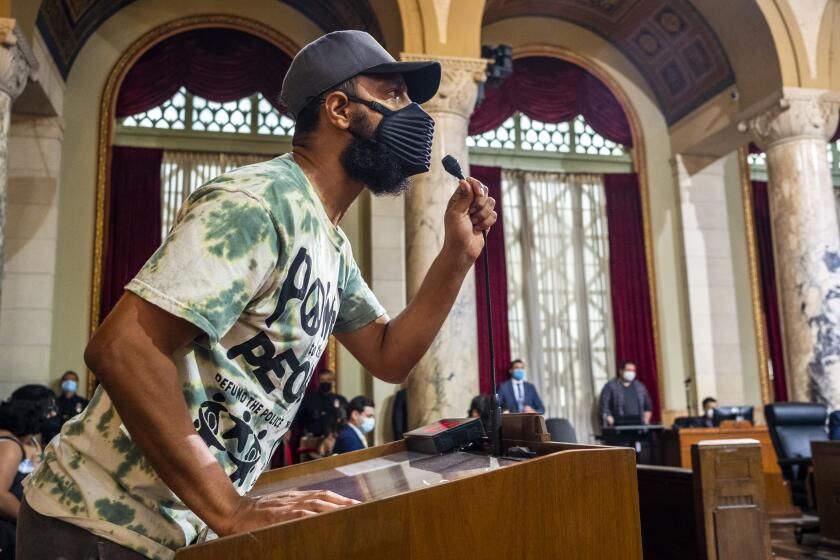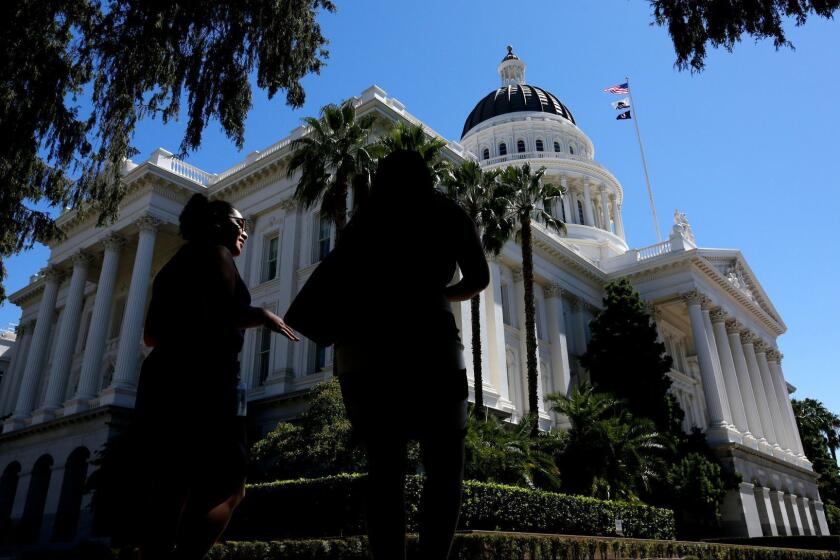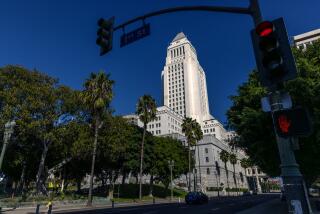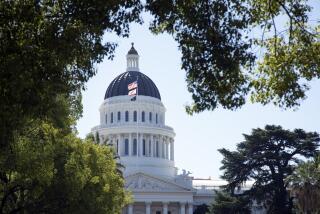Editorial: Don’t let local officials just phone it in. They must show up to public meetings
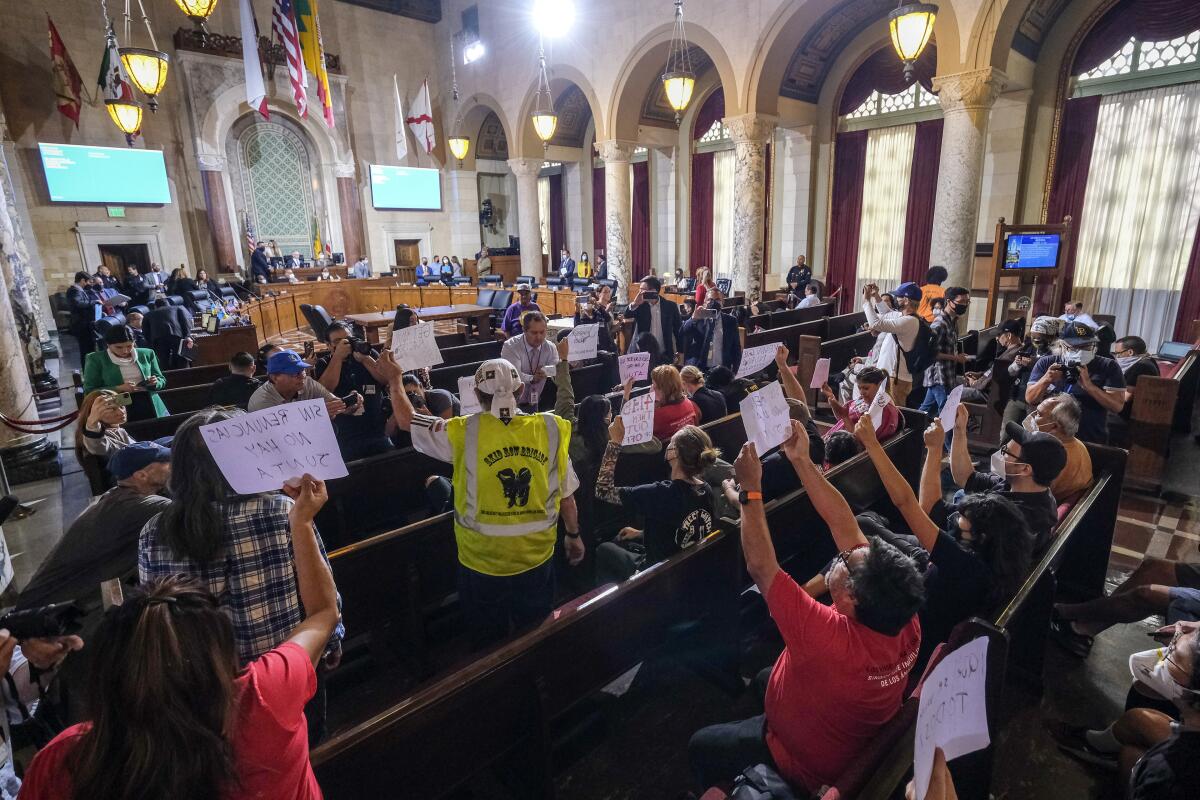
- Share via
There’s a serious wave of COVID nostalgia going around. Many officials who sit on local government bodies like city councils yearn for the days when they didn’t have to physically appear at public meetings.
By executive order issued in the early days of the pandemic, Gov. Gavin Newsom suspended key parts of the Ralph M. Brown Act and the Bagley-Keene Act — the open-meeting laws that apply to local and state government, respectively. Elected officials phoned (or Zoomed, or telecommuted, or whatever) into their meetings. Many liked doing their work from the comfort of home.
So did members of the public, once local governments finally caught up with 21st century technology and made fully public remote meetings possible.
But now the pandemic is over, Newsom has rescinded his emergency order and elected officials have to show up at meetings again.
Pandemic-era remote access to government meetings should be preserved for the public, not for officials who would like to shield themselves from their constituents.
Some don’t like getting back on the freeway, and some surely don’t enjoy being scolded in person by members of the public. It’s the modern era, they argue, and we should act like modern adults and conduct all of our meetings electronically. After all, doing city, county, school or other public business that way during the pandemic allowed more access than ever to members of the public who could participate without fighting traffic, finding childcare or taking off a morning from work. Everyone could take part in civic business from the couch, the car or the kitchen table. Why not make that permanent?
Lawmakers have introduced a slew of bills to pick away at post-pandemic public meeting requirements and at least in part bring back remote meetings. Assembly Bill 1379 would require city councils and other local bodies to have only two in-person meetings a year, unless they want more. AB 817 would exempt from in-person meetings any “subsidiary body,” like a city council committee or advisory committee. Senate Bill 537 would exempt bodies made up of officials from more than one agency, such as the Metropolitan Water District or Metro boards. AB 1275 would exempt student-run community college organizations, even if they make decisions about use of public funds.
The pandemic has forced many government agencies to be more accessible to the public. Yet the Assembly lets some committees block public comment by phone.
But hold on a minute. Remote access to public meetings for members of the public, as an additional option, is one thing. Remote access for the officials, on the other hand, is another. It simply makes them more — remote.
It increases the gulf between the people and their representatives. The option to either walk in or call in rightfully belongs to the public, not their elected or appointed leaders. There is a world of difference between sitting in the same room with officials as they discuss how to spend your money and operate your government, and merely watching them Zoom in from their living room — or financial donor’s estate or beach blanket in Tulum or Ibiza — without being able to see who else may be in that room, estate or blanket with them, giving them directions on what to say or how to vote.
Being able to sit in the same room with public officials, see them and question them face to face, in real life, as they consider public policies is an essential element of democracy. It is as fundamental as a criminal defendant’s right to see, and question, accusing witnesses in a courtroom.
Backers of these bills and other attempts to dismantle open-meeting laws say that remote access means people with mobility limits or family obligations that keep them at home can finally serve as members of government bodies.
Los Angeles County supervisors seem to enjoy their low-tech world where the coronavirus emergency is an excuse to keep the public quiet.
But they already can. A law passed last year, AB 2449, allows meetings to go forward when a particular member has just cause (as carefully defined in the law) to call in, as long as there is a quorum physically present at the meeting. It’s an experiment that has been in effect less than four months. Lawmakers should give it at least a year to see how it works before picking apart open-meeting laws.
Temporary stay-at-home orders were no boon for democracy. Giving the public more options to keep tabs on their leaders is worth hanging on to. Giving those same leaders options for avoiding the public was a consequence we lived with only because we had to. Now that we don’t, we shouldn’t permanently roll back open-meeting laws that have protected the public for three-quarters of a century.
More to Read
A cure for the common opinion
Get thought-provoking perspectives with our weekly newsletter.
You may occasionally receive promotional content from the Los Angeles Times.
